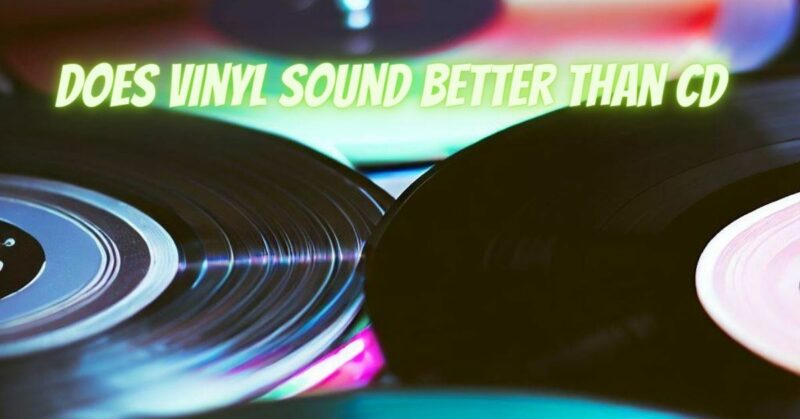The debate between vinyl records and CDs has been a longstanding topic among music enthusiasts. While both formats have their unique characteristics, the question of whether vinyl sounds better than CDs is subjective and depends on individual preferences. In this article, we will explore the factors that contribute to sound quality in vinyl records and CDs, and discuss how personal taste can influence one’s perception of audio fidelity.
Vinyl Records:
Vinyl records offer a distinct listening experience appreciated by many audiophiles. Here are some factors that contribute to the perceived sound quality of vinyl records:
- Analog Warmth: Vinyl records are analog recordings, capturing the sound waves directly on the grooves. Some listeners find that vinyl produces a warm and organic sound, often associated with a more “natural” and “musical” representation of the music.
- Dynamic Range: Vinyl records can exhibit a wider dynamic range, allowing for greater variation between the softest and loudest parts of a recording. This characteristic can enhance the overall listening experience, particularly for genres with complex and nuanced instrumentation.
- Physical Interaction: Some individuals enjoy the tactile nature of vinyl records, including the act of handling and playing them. The process of carefully placing the needle and engaging with the record can enhance the overall enjoyment and engagement with the music.
CDs:
CDs, on the other hand, offer their own set of advantages when it comes to sound quality:
- Digital Precision: CDs utilize digital audio encoding, which offers high fidelity and accurate reproduction of the original recording. Digital technology ensures minimal degradation in sound quality over time and provides a consistent listening experience.
- Low Noise and Distortion: CDs are less susceptible to noise and distortion compared to vinyl records. The absence of surface noise and pops commonly associated with vinyl can result in a cleaner and more precise audio playback.
- Convenience and Accessibility: CDs are portable and easy to handle, allowing for convenient playback in various devices. Additionally, CDs often include additional features such as track skipping, random playback, and easy navigation.
Personal Preference:
It’s important to recognize that sound quality preference is subjective and can vary from person to person. Some individuals prefer the unique sonic characteristics and tactile experience of vinyl records, while others appreciate the precise and consistent sound reproduction of CDs. Factors such as nostalgia, personal attachment, and aesthetic appeal can also influence one’s preference for a particular format.
Conclusion:
The question of whether vinyl sounds better than CDs ultimately comes down to personal preference. Both formats offer their own distinct qualities and characteristics. Vinyl records provide a warm and analog sound, dynamic range, and a tactile experience, while CDs offer digital precision, low noise, and convenient accessibility. It’s advisable to explore and listen to music on both formats to determine which one aligns with your personal taste and listening preferences. Ultimately, the enjoyment of music is subjective, and choosing between vinyl and CD should be based on what brings you the most pleasure and satisfaction in your listening experience.


